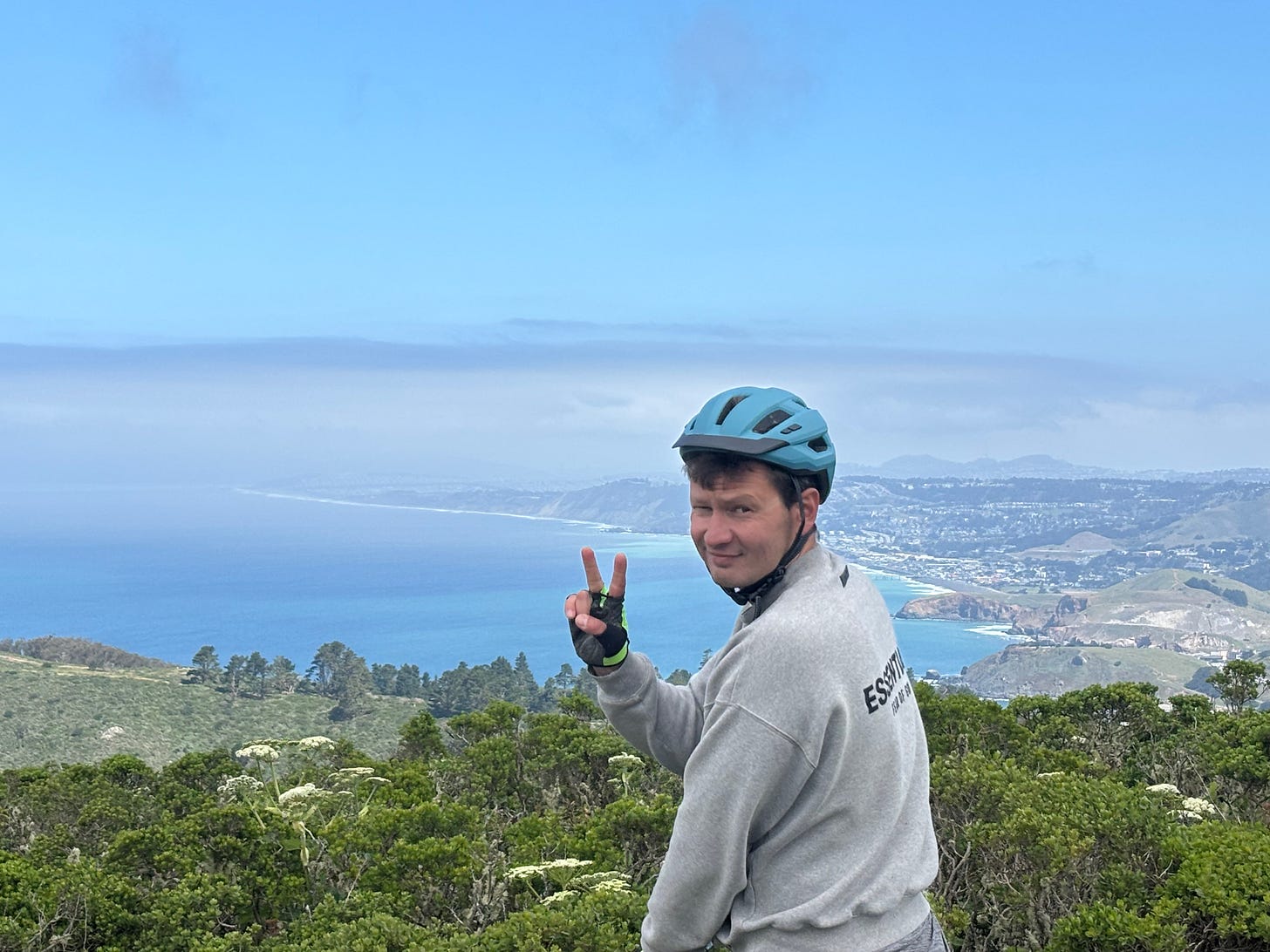How I Learned to Love Exercise by Taking It Outside
Finding fitness, friendship, and mental clarity through climbing, biking, surfing, and swimming in California's outdoors
Growing up in Belarus, I tried many sports but never stuck with any. I played soccer—both street games and in amateur clubs. I trained in ice hockey after a friend whose father played for the Belarusian national team got me hooked on NHL trading cards. But hockey gear was too expensive, so I had to quit. I dabbled in gymnastics and went to the gym occasionally. None of these activities turned me into an athlete. If anything, street soccer was the only constant. The one thing that did stick wasn't a sport at all: chess. I've played it ever since those days.
When I moved to the US, I fell in love with California's outdoors—its mountains, beaches, and forests. Between work and school, I had little time for hiking, but I made it count when I could. Separately from hiking, I discovered an odd pattern: whenever someone taught me the "right" way to do something I enjoyed, I'd lose interest entirely. This happened with tennis—the moment a coach in the Philippines showed me proper technique, I knew I'd never play again. The same thing happened at the gym with a friend. I tried other activities—pickup soccer, and snowboarding at Lake Tahoe—but never stuck with them. Friends who joined my first Tahoe trips became near-professionals while I remained a beginner. The pattern held: casual enjoyment worked for me, but formal instruction killed the fun. The timing was the biggest issue too.
After the pandemic, I started taking hot yoga classes near my co-working space. This marked my return to physical activity, and I stuck with it consistently for a whole year. Then I discovered the value of social exercise. I began rock climbing with a founder I'd invested in, which proved far more engaging than solo activities. Yet yoga had its own merits—particularly its meditative quality. Seeking variety, I eventually replaced yoga with swimming. Later, I added mountain biking, riding every weekend with a college friend from Berkeley. Most recently, I've taken up surfing. Though I'm still learning to stand and balance, I can catch waves consistently.
Mountain biking and surfing changed everything. California offers mountains, forests, and ocean—perfect for outdoor activities. I considered skiing too, but the long drives, crowds, and expensive passes made it impractical. Mountain biking and surfing won. They deliver adventure twice weekly without leaving San Francisco Bay like mini-vacations on demand. All four activities I do—including swimming and climbing—share a meditative quality. Even when I bike or surf with friends, there's something deeply contemplative about moving through nature.
I've discovered three benefits since starting outdoor sports. First, I'm in the best shape of my life—not bodybuilder-level, just consistently fit. Second, these activities force me to slow down and focus on the present moment instead of staring at screens or overthinking problems. Third, I emerge from each swim or mountain bike ride with less anxiety. This matters especially recently when stress seems to accumulate from all directions—the pandemic, wars affecting Eastern Europeans deeply, and personal losses like my mother's death.
Technology has pulled us away from something fundamental. Over the past decade, social media has rewired how we think and connect. Our attention spans have shrunk. We've grown anxious scrolling through endless feeds. Many of us now order food and shop online without leaving home, missing the small human interactions that once taught us how to navigate the world. Each failed attempt, each awkward conversation—these were how we learned. The algorithms that keep us engaged also keep us angry. They amplify outrage because it drives clicks. This might explain why our politics have become so polarized. Meanwhile, we've become lonelier even as we're more "connected" than ever. Nature offers the opposite. A walk in the woods doesn't compete for your attention—it simply holds it. Being outdoors with others creates real connections, not performative ones. You focus on what's in front of you, not what might go viral. In nature, there's no algorithm. Just presence.
I spent years failing at competitive sports—soccer, hockey, gymnastics, you name it. Then I moved to California and discovered something different years later: climbing, swimming, mountain biking, and surfing. These weren't just sports I could stick with. They became how I dealt with real problems. When life got hard—pandemic isolation, war back home, losing my mom—getting outside with friends worked. No coaches, no rules, just nature and movement. The best exercise isn't about perfect form or training plans. It's about finding what actually gets you out the door. For me, that meant activities that combine three things: nature, friends, and a clear head.



Love that you found your passion for exploring the outdoors! Consuming the terrain on a bike is a fun way to see more than you would have otherwise, and under your own effort. I like that it also has this duality of needing to be present and engaged to operate the bike safely on technical roads, while also letting your mind run freely in the easier moments